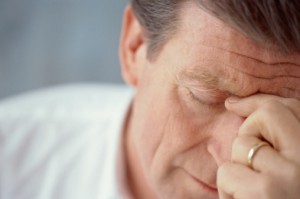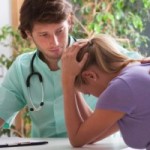

 If you’ve ever strained your back lifting something heavy or trying to rearrange your furniture, you know how bad back pain can be. Or maybe you live with chronic back pain…
If you’ve ever strained your back lifting something heavy or trying to rearrange your furniture, you know how bad back pain can be. Or maybe you live with chronic back pain…
You’re all too familiar with the agony it can bring and the roadblocks it creates in everyday life. Maybe you’ve been advised to “slow down” or not to do things that could cause more pain. This can really have an impact on your life and even your mental well-being. In fact, recent studies have revealed some insight into the association between chronic back pain and depression.
Pain makes it difficult to enjoy your life. It makes it challenging to move, sleep and interact with friends, family and your neighbors. Beyond the actual pain itself, there may be gastrointestinal issues brought on by anti-inflammatory medication, too.
In general, depression is the most common illness linked to chronic back pain. In fact, depression is more commonly witnessed in patients with chronic back pain problems than in patients with acute, short-term pain. The type that accompanies such pain is referred to as major depression or clinical depression. This kind goes well beyond the sadness that would be deemed normal, like the emotion of feeling down for a couple of days.
Instead, the symptoms of major depression occur every day for at least two weeks. They include at least five of the following simultaneously:
 Genetics are behind the link between lower back pain and depression, according to a pair of studies recently conducted by the University of Sydney and Spain’s Murcia Twin Registry, and published by the International Association for the Study of Pain. Their studies are the first to examine the true relationship between lower back pain and depression.
Genetics are behind the link between lower back pain and depression, according to a pair of studies recently conducted by the University of Sydney and Spain’s Murcia Twin Registry, and published by the International Association for the Study of Pain. Their studies are the first to examine the true relationship between lower back pain and depression.
Researchers looked at data from the well-established Murcia Twin Registry, which includes about 2,150 Spanish twins. These twin studies offer a unique chance to explain the link between health conditions, simply by eliminating the genetic and environmental factors that led to the conditions in the first place. So you can get an accurate look at the genetics.
Responses to questionnaires helped to determine whether participants with symptoms of depression experienced more back pain. What they found was a clear link between the two. Upon further analysis of what are called monozygotic twins – those who are genetically identical – the association between lower back pain and depression completely disappeared, however.
In the past, studies revealed a consistent relationship between back pain and depression – a combination that may complicate diagnosis and treatment.
The treatment of the kind of depression linked to chronic back pain demands a more specialized approach. Typically, both should be treated at the very same time and in a multidisciplinary fashion. The treatment of clinical depression, more often than not, should include psychological interventions – things like relaxation and mindfulness training, counseling and antidepressant medication.
Although the results of the latest studies do seem promising, it remains unclear whether common genetic factors lead to people developing both chronic back pain and depression. Additional studies, involving participants who are followed up with over time – ideally twins – are still needed.
In the meantime, remember to take it easy on your lower back – especially while lifting the garbage. And while you’re at it, be sure to look after your own mental health by enjoying healthy foods, activity and keeping in touch with your friends and family.
Depression, anxiety and OCD increase risk of sleepwalking
Depression, anxiety and obsessive compulsive disorder (OCD) increase the risk of sleepwalking. An estimated 3.6 percent of the adult population in the U.S. are prone to sleepwalking. Researchers from Stanford University School of Medicine have found a link between depression, anxiety and OCD as risk factors of sleepwalking. Continue reading…
Physical activity after heart attack protects against depression
New research has revealed that regular exercise after a heart attack can protect against depression. The data, from the Nord-Trøndelag Health Study in Norway, examined 189 patients prior to entering a hospital for a heart attack. The researchers aimed to determine the effectiveness of exercise on depressive symptoms post heart attack. Continue reading…
Copyright © www.orthopaedics.win Bone Health All Rights Reserved